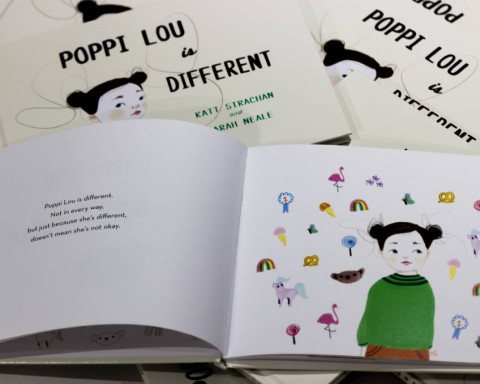
A Tasmanian mother is hoping to promote social acceptance of autism with a picture book that teaches children and their parents about autism.
Katt Strachan has written Poppi Lou is Different which features Poppi, her nine-year-old daughter who is on the autism spectrum.
Ms Strachan said she started writing the book after Poppi came home from school sad and upset because other children did not want to play with her.
“What upset me the most is that Poppi was being ostracised by other children,” Ms Strachan said.
“I know what an awesome kid she is and what an awesome friend she could be. I wanted other kids to see that. Poppi is not that different to other kids, she likes the same books, the same toys, the same movies, she just functions a little bit differently.”
When researching for her book Ms Strachan said she could not find anything that would assist children to better understand the “different” behaviours of their peers on the autism spectrum.
“This is a tool for parents and teachers to try and get other kids to be a bit more socially accepting of those with autism,” Ms Strachan said.
“Children should know that if one of their friends has autism then they need to be a bit more understanding of their behaviours, which they often cannot control.”

Katt Strachan with her daughter Poppi Pictures: Supplied
Poppi Lou is Different is a rhyming book aimed at primary-school aged children.
“Just because Poppi is different doesn’t mean she is sick, or disabled, or not OK,” Ms Strachan said.
“The book explains that she doesn’t like loud noises or certain textures on her skin, and that she is an amazing athlete, but when it comes to school work she struggles a lot,” she said.
“It then basically says that if you see someone having a meltdown, don’t laugh at them, or tease them, or leave them out of your group, just ask if they are OK and then invite them to come and play.”
Ms Strachan realised early in Poppi’s life that she might be on the autism spectrum.
Poppi was non-verbal until later in life, walked on her tippy-toes, and displayed obsessive compulsive behaviours.
Ms Strachan said Poppi now gets easily frustrated when she is trying to explain something and people do not understand, and her brain processes sound differently, where loud noises are an assault on her senses.
“When she was little and a motorbike went past the house she would go rigid, lay face down, scream and have a meltdown.
“As she gets older she deals with it a lot better, but she can still get severe anxiety, where her body stiffens and tenses and she can’t verbalise what she is feeling, which tends to lead to her crying, getting upset, or screaming.”
Ms Strachan said she wanted to remove the social stigma attached to kids with autism.
“I don’t want it to be a taboo word as it has been for such a long time. There is nothing stopping these children except people who are trying to hold them back because they are different,” she said.
“When we told friends and family they said they were ‘so sorry’. But I was like ‘don’t be sorry, she is still the same sweet, bubbly, fun child, but we now know what we are dealing with’.”
“This book will help kids with autism.”